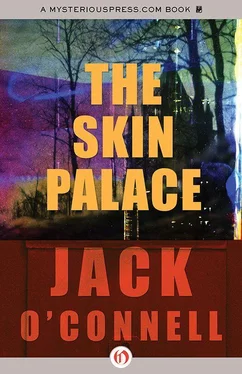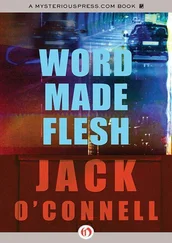But there’s no safe place to run. The children are fanned out and seem to have the whole of the main hall covered from every direction. They make no noise beyond the striking of their missiles. They appear to have an endless supply of rubble to use as ammunition.
Jakob tries a crawling run from column to column. Scrap metal and stones and rail spikes and small shafts of wood rain down around him. He flinches, takes a hard blow to the shoulder and sees he’s been hit by an unopened soup can. He rolls to the side, still trying to shield the Seitz, and a chuck of marble falls inches from his head.
“Please,” he tries to yell. “I’ll leave you alone.”
There’s a moment of amnesty and he takes it, climbs to his feet and starts to run for the hole he used to enter the station. As he approaches his exit, the attack begins again and as he squeezes through to the yard outside, he takes several blows to his back and head.
He falls outside bleeding, but he thinks the Seitz is unharmed. He gets up, starts to run toward Ivano Ave. He makes it a block, to the intersection of Polito, then lets himself slump against a street lamp and catch his breath.
Across the block, a crowd of hookers loitering in front of the Occidental Lounge seem to turn their collective attention his way. He tries to think of the fastest way back to the St. Vitus. Then he hears the screaming from behind.
Kidnapper. Murderer. Child Killer .
He turns back to Gompers Station, sees a small figure at the edge of the station’s roof. It’s pointing down in his direction, the voice so much larger than the stature should indicate. It’s the little girl from the Dumpster.
It’s him. He took Jenny Ellis. He killed Jenny Ellis.
A crowd starts to empty into the street from the Bangkok clubs and alleyways. And Jakob realizes what is about to happen.
He killed her. He killed the little girl.
He straightens up, hears voices being raised. One of the hookers starts pointing across the intersection toward him, yelling, “That’s him. That’s the son of a bitch who grabbed that little girl.”
He doesn’t wait for another word. He turns and bolts back down Ivano and knows the crowd is going to follow.
And they do. This drug-steamed parish of the night instantly transforms itself into the classic angry village and begins its pursuit. Jakob knows he could run faster if he dropped the Seitz, but that just isn’t a possibility. From the sky behind him, from the rooftop of Gompers Station, a child’s voice of unthinkable power explodes, an alarm bell ringing into consciousness an instantaneous mob mentality. And this mob is comprised of the citizens of the meanest tenderloin imaginable.
The babykiller. The babykiller is here.
Jakob runs across Haller Road, hangs a left onto Mac-Donald. The noise behind him is increasing and drawing nearer. There’s an awful taunting quality to it. He can’t make out any words, only a threatening babble. The sound track to a brutal demise born of blood-lust and a chronic, indiscriminate rage. He throws himself through a series of interconnecting alleyways and comes out on Polito. He’s run a full circle. Across the street is the opposite border of Gompers Station.
He starts to hesitate, but the sound of barking dogs drives him across the road and through a gap torn into some rusted cyclone fencing. He picks the first open boxcar he sees and climbs inside it. And only then does he realize how badly his head is pounding. His lungs begin to seize up on him and he claws at his pockets for his medication, but comes up empty.
He rolls onto his stomach, lets his head rest against the floor of the boxcar, thinks he might be able to pass out. He can no longer tell if the noise of the mob is growing fainter or drawing nearer. He touches the Seitz, strokes it, keeps his hand on the grip.
Some time passes. A series of minutes filled only with the sound of his decayed lung expanding and contracting like a sputtering motor consuming its last drops of fuel.
And suddenly Jakob realizes that he’s lying on a blanket of white paper. The entire floor of the train car, every inch, is carpeted with “Missing” flyers.
He rises up on his elbows, lifts his head, blinks to clear his vision. He looks down to the floor of the train car and reads
Have You Seen This Child?
He stares at the words as if they might mutate into a parade of insects and march off the page. He stares until the words lose their meaning.
And only then does he let himself look at the photo beneath the words. The picture of Jenny Ellis. The picture of the little girl from the Dumpster.
You escaped, he thinks, shocked at his envy as much as his discovery. You escaped as I wish to escape.
He gets up on his knees, picks up one of the flyers, runs a hand over the photocopied visage.
I would never have told them, Jenny. I understand completely. As only I can understand I only wanted your face.
He folds the flyer and slides it into the inner pocket of his coat.
There is no need to fear me, Jenny. I only wanted your picture.
Walking through the city at night, this night, is like walking through a serial dream, a slightly gauzy mirage where, though specific images repeat on a regular basis, the whole of the landscape never gets very clear or recognizable.
The apartment is about five miles from the theatre and it’s after four in the morning when Sylvia finally walks up the back stairs, still dressed in the remains of the Berkshires nightgown and Propp’s coat. Her hand on the back door, she pictures Perry sitting at the kitchen table, still in his suit though the tie will be pulled loose from his throat and the top button may be undone. Will she even try to offer some explanation? Or will she just stand still and wait for the yelling to dwindle so she can crawl into bed and try hard to fall asleep and pray that there’s some way to go back to the day before the Aquinas, before the seven pictures that have melted her life into this unrestricted chaos?
She takes the key from the molding lip, unlocks the door, replaces the key and heads into the kitchen. She flips on the light, puts the Canon down on the countertop and she’s both relieved and surprised that Perry isn’t there. She closes the door quietly and walks to the bedroom. The bed is empty but the red light on the answering machine is blinking in the dark. She hits the playback button and after the rewind comes Perry’s voice, hushed but clearly drunk.
“Syl, good, don’t get up, stay there, it’s me. I’m at Eddie Meade’s place. It’s about one A.M. and we’ve had a few, we’ve had quite a few, you know, drinks. After the meeting. After we finished the meeting. So I’m in no shape to drive home and I’m just going to sack out here on Eddie’s couch. Okay? You sleep. Hope you feel better in the morning. You sleep. I’ll talk to you then. We’ll talk in the morning.”
She sits down on the edge of the bed and puts her head in her hands. She’s too tired to laugh. She pulls the slippers off her feet and throws them in the wastebasket. She thinks about pouring some wine, going into the living room, flipping on the tube and seeing what Peter Lorre is up to. She unbuttons Propp’s coat and shrugs out of it, holds it in her lap and realizes it would be hard to explain if Perry saw it lying on the bed in the morning. She gets up, goes to the closet, opens the door and stares into Rory Gaston’s terrified face.
It’s his eyes that keep her from letting out a scream that could wake up Mrs. Acker. Gaston’s eyes are so wide and flinching he looks like a child on his second trip to the dentist. He’s hunched in on himself, trying somehow to disappear, a deer that’s suddenly sensed a predator in close proximity. He starts shaking his head no over and over and Sylvia’s first wave of shock and fear is replaced by anger undercut by just a little pity.
Читать дальше











